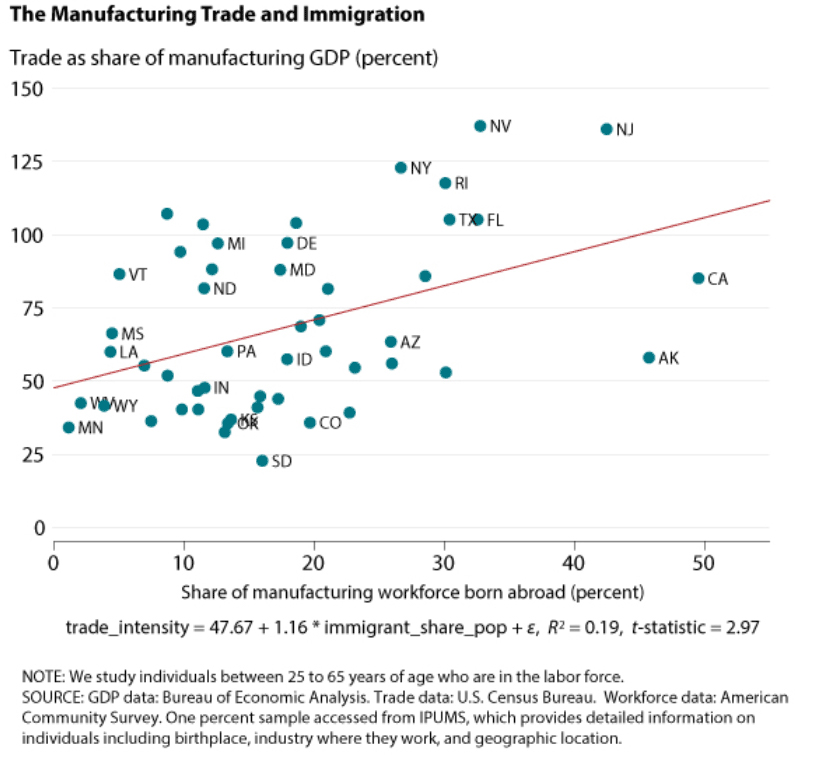Immigrant Workers and U.S. Trade Activity

U.S. states are diverse economies, with great variations in the trade in manufactured goods and in the makeup of their labor forces. An Economic Synopses essay explored the possible link between U.S. trade activity and immigrant labor in the manufacturing sector.
Economist Fernando Leibovici and Research Associate Matthew Famiglietti noted several reasons why immigrants might play a role in spurring trade activity:
- They know foreign languages, markets and customs, which could ease forming business connections abroad and increase exports of manufactured goods.
- Their familiarity with foreign goods or processes might improve U.S. production, increasing imports of manufactured goods.
- Skilled immigrants may increase the productivity of U.S. firms and make these firms more competitive globally, facilitating additional trade.
There may also be noncausal reasons for the relationship between immigrants and trade, the authors noted.
“For instance, border states or those with coastlines might be likely to trade more internationally while also being more likely to have more foreign-born workers,” they wrote.
Measuring Intensity
To explore this question of immigration and manufacturing trade, the authors looked at the relationship between the intensity of trade in a state’s manufacturing sector and the share of immigrants in a state’s manufacturing workforce.
To gauge intensity of trade, the authors added the state’s exports and imports of manufactured goods together, divided the sum by the state’s manufacturing GDP, and then divided this measure by two. They also calculated a state’s share of the manufacturing labor force born outside the U.S.
Examining the two measures suggests that the share of foreign-born workers and the share of foreign trade in manufacturing are correlated, the authors observed.
“For example, Texas, Florida and Nevada have high levels of both measures,” they wrote. “States in the Northeast, Southeast and West also have high levels of both, while states in the Great Plains have relatively low levels of both.”
Measuring Correlation
Leibovici and Famiglietti then plotted the two measures (as shown below) and calculated the regression line.

They found that a 1% increase in the share of foreign-born manufacturing workers is associated with a 1.16% increase in international trade as a share of manufacturing GDP.
The results show that states with higher shares of immigrant workers in the manufacturing sector are more likely to trade more in manufactured goods, they noted.
“This finding may have important implications for the design of both international trade and immigration policy and for evaluating the gains from increased openness to either,” they concluded.
Additional Resources
- Economic Synopses: Immigration and International Trade in U.S. Manufactured Goods
- On the Economy: Comparing Value-Added Trade and Gross Trade
- On the Economy: Protectionism and Dependence on Imports of Essential Medical Equipment
Citation
ldquoImmigrant Workers and U.S. Trade Activity,rdquo St. Louis Fed On the Economy, Sept. 17, 2020.
This blog offers commentary, analysis and data from our economists and experts. Views expressed are not necessarily those of the St. Louis Fed or Federal Reserve System.
Email Us
All other blog-related questions

